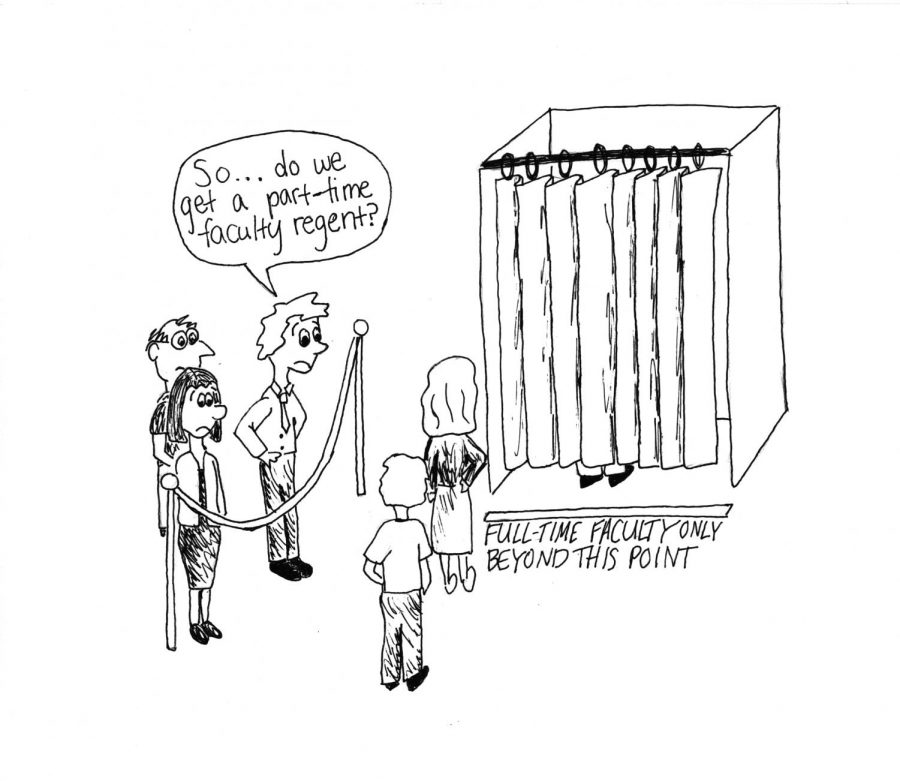EDITORIAL: Part-time faculty deserve a say in regent election
October 25, 2017
The Issue: Barbara Burch, the current faculty regent, may finish her term in this position this Friday, Oct. 27. The election, which would decide the new faculty regent, has been stalled due to ineligible voting. Only full-time faculty members were allowed to vote in this election, a longstanding policy for WKU. Since some part-time faculty members also voted, the results were thrown out.
Our Stance: The faculty regent is a voting member of the Board of Regents, an independent governing body that administers to the needs of the university. The faculty regent is responsible for addressing faculty concerns in University Senate meetings, as well as reporting on what happens during Board of Regents meetings. The part-time faculty is just as much a part of this university as everyone else. Therefore, their voice should be heard in this election.
At some point in your college career, if you haven’t experienced this already, you will likely sit through a class where your professor goes off on a lengthy tangent about an unfair practice taking place at WKU. More often than not, faculty are stuck with the short end of the stick whether it is an insufficient amount of faculty parking or the bloated salaries of athletic coaches compared to other faculty salaries.
These reasons are why the position of faculty regent, who is responsible for addressing faculty concerns during Board of Regents meetings, is so important.
So it is outrageous that part-time faculty, a position that has increased in number at WKU by over 20 percent since the Fall 2012 semester, does not have a say in who this person will be. 416 part-time faculty members will not have their voices heard in an election that will affect how issues will be settled in Board of Regents meetings.
After the first attempt at electing a new faculty regent was dismissed due to none of the candidates receiving the required 50 percent of the vote, a second election attempt was deemed inconclusive as it was discovered that some part-time faculty participated in the voting process.
According to the WKU Fact Book, as of Fall 2016 part-time faculty comprised 35 percent of the entire faculty population. How can one expect to get an accurate representation of faculty issues when almost half of them can’t choose who represents them?
Mac McKerral, a professor in the School of Journalism & Broadcasting, and Claus Ernst, a professor in the Department of Mathematics, are the two top candidates for the position of faculty regent.
In an e-mail from Ernst, he noted that, according to Kentucky law, “…voters must have the rank of instructor, assistant professor, or above. Thus there is not much WKU can do to change [the] rule directly. Whether this is the right thing to do is questionable. There are over 400 part time instructors and many full time instructors that are not tenure track. All of these are specifically excluded to either vote or be a candidate. I am open to allow full time permanent instructors to be candidates, or to let part time faculty who have been with WKU for a number of years vote. One can argue about the specifics of what permanent means or how many years one should have worked for WKU before allowing folks to be part of the process.”
When reached for a comment, McKerral wrote in an e-mail, “I have stated consistently during the election that while the board seat is for the ‘Faculty Regent,’ its constituency — the entire board’s constituency — is all faculty, staff and students at WKU — the WKU community. That community is connected at all levels. We rely on each other. We cannot be severed.
“I also would be remiss if I did not tell you that who can vote in this election — while worth discussing — is not as important as what is at stake in the election, and encouraging those who can vote to seriously consider the choices and to vote is most important.”
Given that the next election is scheduled for this Friday, it would be next to impossible to change the legislation regarding voter requirements. However, this does raise suspicion as to whether the outcome of the faculty regent election will be an accurate representation of the faculty population at WKU.
























